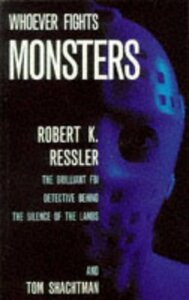Take a photo of a barcode or cover
Y'all, I really, really wanted to like this book. At first glance, it's exactly up my ally (I love true crime, I'm fascinated by serial killers, psychology/profiling is super cool).
But I just couldn't get behind this one. My main problems, I think, were:
1. The style of writing was just...sub-par, for me. I tried to be lenient in my thinking here because I know Ressler wasn't a writer, he was a crime guy writing about being a crime guy. Still, a lot of this was just hard for me to get through. This was my main gripe. I was just really not drawn into this writing and it made it really hard for me to stay engaged. Written differently, I know I could have really loved a book like this.
2. The self-aggrandizing bits of this were...something else. I get that this was autobiographical and I fully accept that he did wonders for how we study the criminal mind, but there were passages in here that were just A LOT. Like, ok fam, we get it, you're a hero, no need to devote massive passages to patting yourself on the back.
3. I was kind of bored by a lot of this because I already knew the information. I realize this isn't the fault of anyone but me for being so obsessed with true crime and doesn't really speak to the quality of the book, but I thought it was worth noting anyway for other true-crime fans. I sort of expected this to be less an overview of really popular murderers (Bundy, Kemper, Speck, etc) and more an in depth explanation of what goes into profiling and it wasn't that.
Despite the fact that I totally struggled to finish this book (not gonna lie, I skimmed the last 1/4th of the thing) I'm giving it three stars because I think that the topic is compelling and I think this book would probably be better suited for someone who is maybe looking for an introduction to true crime (if you're a true murderino freak like me, don't bother, because you are already familiar with half this text).
But I just couldn't get behind this one. My main problems, I think, were:
1. The style of writing was just...sub-par, for me. I tried to be lenient in my thinking here because I know Ressler wasn't a writer, he was a crime guy writing about being a crime guy. Still, a lot of this was just hard for me to get through. This was my main gripe. I was just really not drawn into this writing and it made it really hard for me to stay engaged. Written differently, I know I could have really loved a book like this.
2. The self-aggrandizing bits of this were...something else. I get that this was autobiographical and I fully accept that he did wonders for how we study the criminal mind, but there were passages in here that were just A LOT. Like, ok fam, we get it, you're a hero, no need to devote massive passages to patting yourself on the back.
3. I was kind of bored by a lot of this because I already knew the information. I realize this isn't the fault of anyone but me for being so obsessed with true crime and doesn't really speak to the quality of the book, but I thought it was worth noting anyway for other true-crime fans. I sort of expected this to be less an overview of really popular murderers (Bundy, Kemper, Speck, etc) and more an in depth explanation of what goes into profiling and it wasn't that.
Despite the fact that I totally struggled to finish this book (not gonna lie, I skimmed the last 1/4th of the thing) I'm giving it three stars because I think that the topic is compelling and I think this book would probably be better suited for someone who is maybe looking for an introduction to true crime (if you're a true murderino freak like me, don't bother, because you are already familiar with half this text).
There was some good information and some interesting stories in this book. But most of it was the author patting himself on the back. That got boring pretty quickly.
whoa man this dude is full of himself, but also this was fascinating. audiobook is a hard choice--most def narrated by a robot
Interesting, but far more about the author than the serial killers
If you have an interest in serial killers (no comment), this book is the definitive guide of the practice popularly known as 'profiling' - using various clues about the crime and the victims, to determine likely information about the killer. The author, Robert Ressler, was one of the early founders of the FBI's Behavioral Science Unit, and this book lays out a lot of the categories and indicators which have become associated with profiling (organized/disorganized killers, childhood bedwetting and animal torture, etc). Ressler interviewed well over a hundred incarcerated killers during his career, excerpts of which are included here, along with Ressler's story of the origin of national systems such as VICAP, designed to share information across police jurisdictions.
The book is well written, gruesome, and educational; it's a good read on a peculiar topic.
The book is well written, gruesome, and educational; it's a good read on a peculiar topic.
I’ve read a few of these FBI non fiction murder books now, most noticeably [b:Mindhunter: Inside the FBI's Elite Serial Crime Unit|36114475|Mindhunter Inside the FBI's Elite Serial Crime Unit|John Edward Douglas|https://images.gr-assets.com/books/1508625511s/36114475.jpg|3979692], which I found more interesting than this. Unfortunately I found Robert Ressler not as charismatic as Douglas in his examination and explanation of various cases - although his knowledge is undeniable. He’s just a bit more sedate and academically inclined compared to Douglas’ more sensationalist approach. I will say his personality is slightly less irritating than Douglas though, as he tends not to self congratulate as much (it does happen though). I would have preferred more talk about the various cases rather than Ressler’s personal background too, but understand that it might have been necessary to include it to gain an insight into Ressler’s way of thinking etc.
The book is also obviously dated, with no new chapters referencing anything past the early 1990s. I really need to find more modern texts, but so far nothing is quite as superior as these for definitive facts and information relating to violent crimes etc.
Overall, this was good but historical, and covers a fair few crimes I hadn’t heard of and examined them in a clean analytical way. Any recommendations for something more recent would be appreciated!
The book is also obviously dated, with no new chapters referencing anything past the early 1990s. I really need to find more modern texts, but so far nothing is quite as superior as these for definitive facts and information relating to violent crimes etc.
Overall, this was good but historical, and covers a fair few crimes I hadn’t heard of and examined them in a clean analytical way. Any recommendations for something more recent would be appreciated!
Interesting but clearly dated. I found myself chuckling every time the author said something like “as of 1993…” The book makes a distinction between organized and disorganized murderers and the different traits between each. The rest of the book focuses on the actions of various serial killers such as Edmund Kemper and John Wayne Gacy.
Recommended for those who like Mindhunter on Netflix or are interested in learning more about criminal profiling. I’ll also say that this book isn’t for the faint of heart because it is incredibly graphic in its discussion of various murders. I had to put it down several times and go read something else because it’s so disturbing.
See more of my reviews: Blog // Instagram
Recommended for those who like Mindhunter on Netflix or are interested in learning more about criminal profiling. I’ll also say that this book isn’t for the faint of heart because it is incredibly graphic in its discussion of various murders. I had to put it down several times and go read something else because it’s so disturbing.
See more of my reviews: Blog // Instagram
This book is an interesting look not just into the minds of killers but into the minds of those who help catch them. "Whoever Fights Monsters" is certainly not for those who are sensitive to descriptions of violence. It goes into gory detail in order to explain the minds of those who would commit such crimes. I had to take breaks from reading it several times.
If those descriptions don't bother you, this is a great book for anyone interested in the psychology of violent criminals. This book isn't just about the psychology that we now know, but how the FBI built profiles and laid the groundwork for modern profiling and investigations.
If those descriptions don't bother you, this is a great book for anyone interested in the psychology of violent criminals. This book isn't just about the psychology that we now know, but how the FBI built profiles and laid the groundwork for modern profiling and investigations.
Audible narrator did a good job. Learned a few facts I didn't know about a lot of cases I've heard a lot about. I appreciate his accuracy and patience in discovering the truth of human behavior rather the sensational. In the final chapter he talked about how he thought the FBI needed Clarice Starlings about as much as local police departments needed Dirty Harrys and I also appreciated that.
This is a really interesting one because I've read Douglas's memoir about it and watched Mindhunter. Overall, I like Ressler better. Douglas is a bit outlandish, for me, but Ressler shows the science of it and how they did the research, along with exactly how they had to wine and dine to make sure they got the funding they needed. It's an interesting book full of cases -- some I've heard of, some I haven't -- that highlight what he's interested in. While I don't think that some of the terms or thoughts have aged too well, it's a very solid book.







